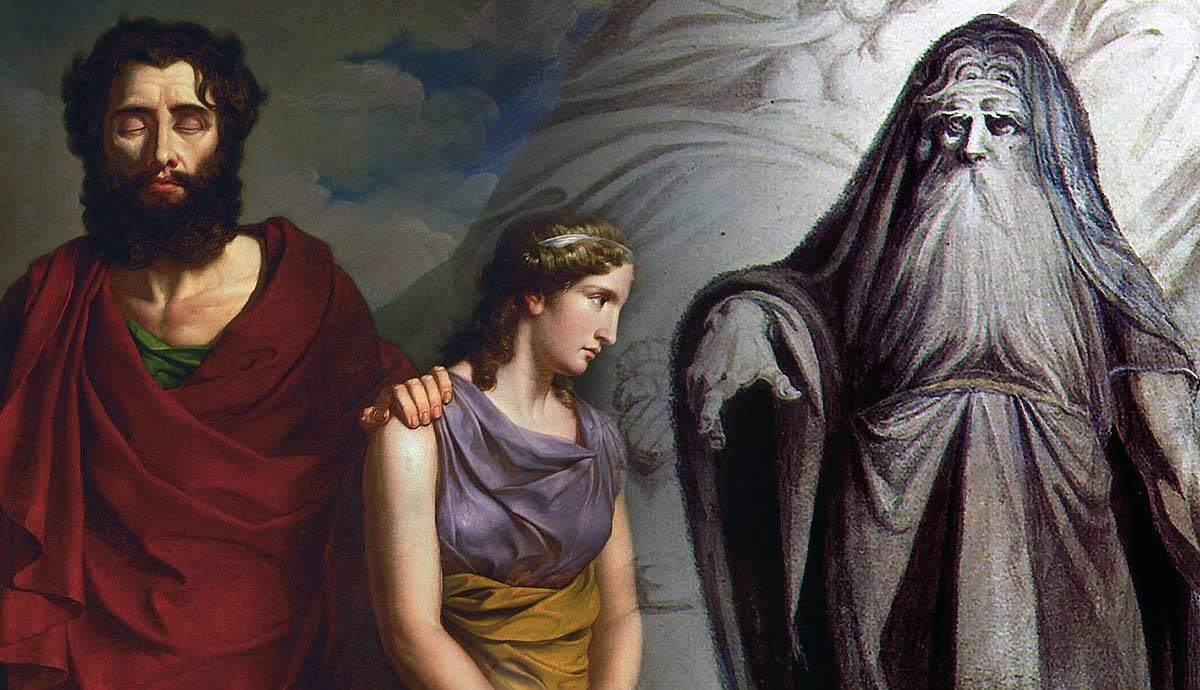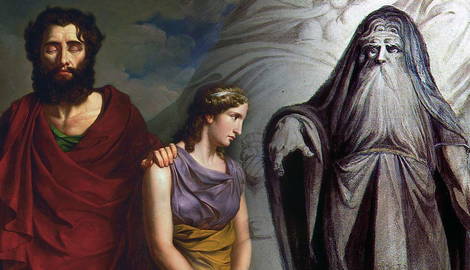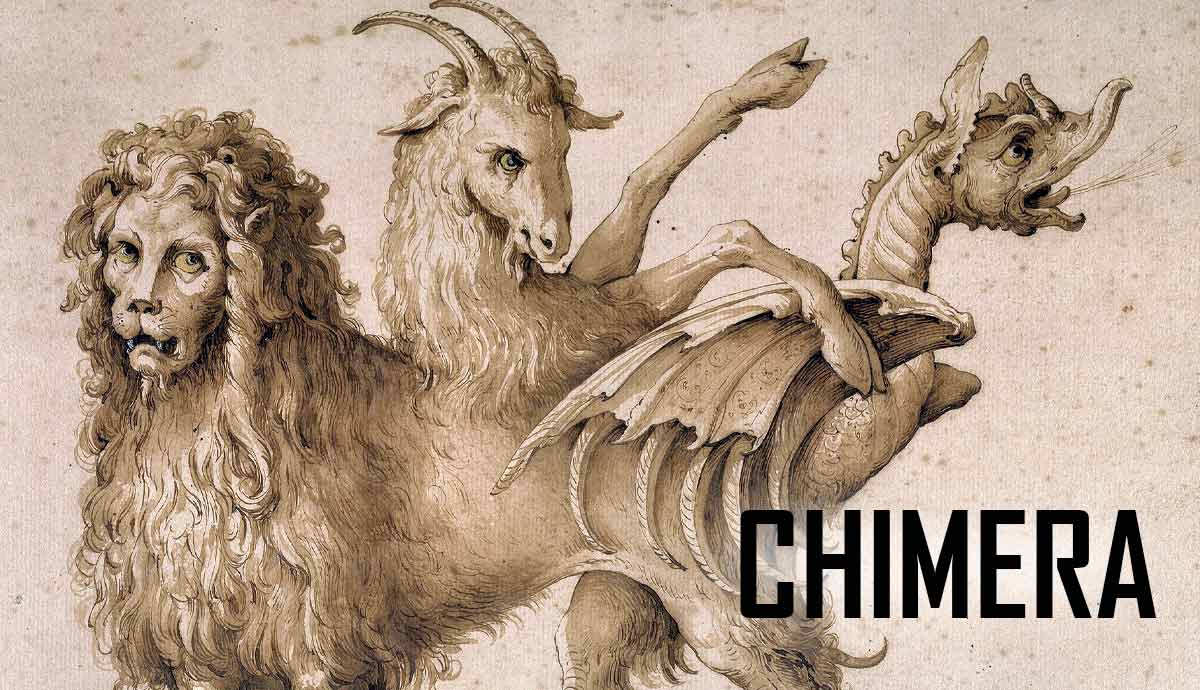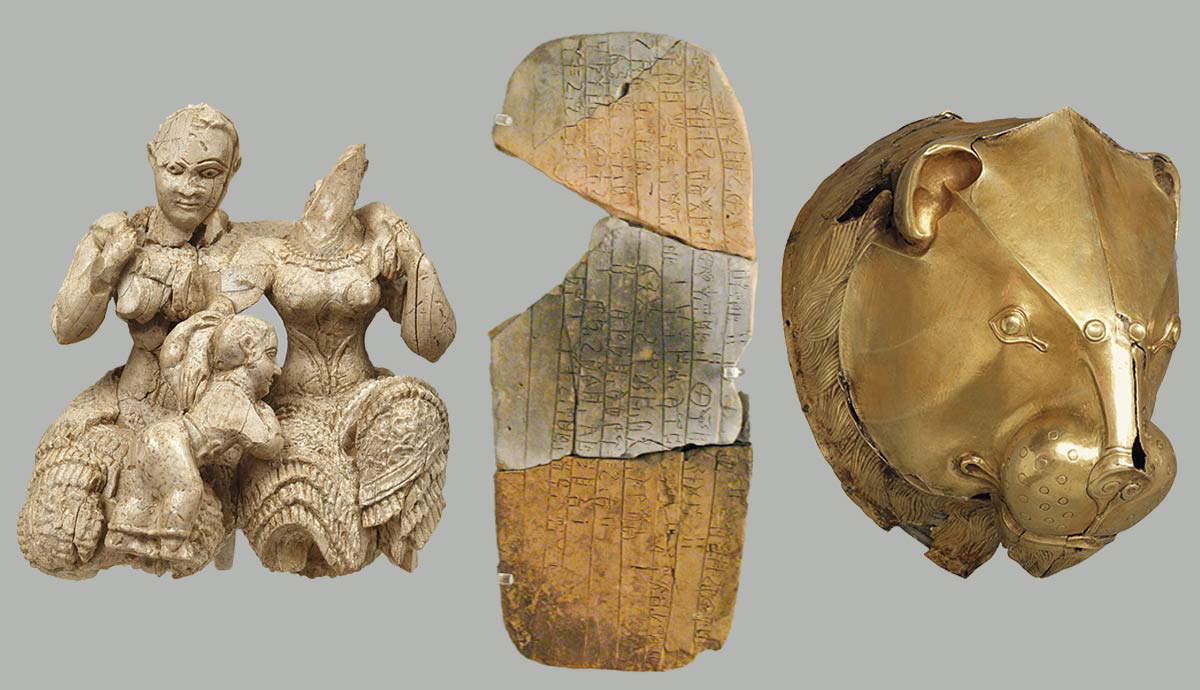
Tiresias, the blind prophet from Thebes, is one of the most renowned seers in Greek mythology. After being struck blind by one of the gods, Tiresias was granted the gifts of prophecy and longevity. As a prophet, Tiresias played a vital role in the mythology of Thebes. However, before all of this, he lived a different life altogether. As a young man, he attacked a snake and was transformed into a woman for seven years before being turned back into a man. Learn the intriguing story of the prophet Tiresias.
Tiresias’ Family

Tiresias was the son of the Theban shepherd Everes and the nymph Chariclo. Everes was believed to be a descendant of Udaeus, one of the five Spartoi, or “sown men,” who emerged from the earth after the hero Cadmus sowed dragon’s teeth into the soil. The Spartoi helped Cadmus build Thebes and establish the city’s royal families, making Tiresias a member of the Theban nobility. His mother, Chariclo, was Apollo’s daughter and was a devoted attendant to the goddess Athena.
The Blind Prophet

Like many ancient Greek prophets, Tiresias received his prophecies through various means. These could come to him as visions or through the interpretation of birdsong, smoke from burnt offerings, or animal entrails that were described to him. Pliny the Elder credits Tiresias with inventing Augury, the ancient Greek and Roman practice of observing the behavior of birds to receive omens.
There are two prominent stories about how Tiresias gained his exceptional prophetic abilities and became blind. Both tales involve the gods, who struck Tiresias blind as punishment and then granted him foresight as compensation. However, a third version diverges from the familiar narratives, suggesting that Tiresias was born with his prophetic gifts rather than receiving them from the gods. Tiresias freely used his abilities to predict the fates of all who sought his counsel, which angered the gods. As a result, they punished him by taking away his sight for revealing too much of the future to humanity.
The Origins of the Blind Seer: Glancing at Athena

According to one myth, the goddess Athena granted prophetic gifts to Tiresias but also caused him to become blind. The story goes that when Tiresias was a young man out hunting, he went to the Hippocrene Spring on Mount Helicon to quench his thirst. There, he accidentally stumbled upon Athena while she was bathing in a pool. Upon noticing him, Athena punished Tiresias by striking him blind, as he had seen her naked without her consent, albeit unintentionally.
Chariclo, Tiresias’s mother and one of Athena’s devoted attendants, begged the goddess to restore her son’s eyesight. Unfortunately, Athena could not undo her curse, as divine law dictated that anyone who glimpsed a god without permission must be struck blind. However, she decided to compensate him for what had happened by granting Tiresias several divine gifts. Athena granted him the gift of prophecy by cleansing his ears, enabling him to foresee the future through understanding the songs of birds. She then provided him with a cornel-wood staff that would enable him to walk as if he could see and granted him a long life that would span several generations. Finally, Athena decreed that Tiresias would retain his divine gifts, memories, and mind in the Underworld after death.
Origins of the Blind Seer: Snakes, a Sex Change, and Hera’s Punishment

Another popular story about how Tiresias lost his sight and gained his prophetic abilities is quite bizarre and convoluted. When Tiresias was a young man, he encountered a pair of snakes mating while walking on Mount Cyllene in the Peloponnese. For reasons known only to Tiresias, he attacked and killed the female snake with a stick. This act angered Hera, the queen of the gods, who punished Tiresias by transforming him into a woman.
Tiresias embraced her new life as a woman, becoming a priestess of Hera. She married and had at least one daughter named Manto, who also possessed the gift of prophecy. Tiresias was said to have had two other daughters: Historis, who became an attendant to Heracles’s mother, Alcmene, and Daphne, who also possessed the gift of prophecy and went on to become the oracle of Delphi. Some people believe that Manto and Daphne might be the same person. If Historis served Alcmene, then based on the timeline, Tiresias likely fathered her while still a man rather than after becoming a woman.
After spending seven years as a woman, Tiresias encountered another pair of mating snakes in the woods. This time, Tiresias attacked and killed the male snake and was instantly transformed into a man. In some variations of the story, Apollo had informed Tiresias that if she found another pair of mating snakes and attacked them similarly, she would revert to being a man.

Tiresias’s unique experiences as both a man and a woman put them in the perfect position to resolve a long-standing argument between Zeus and Hera: who enjoys sex more, men or women? Zeus believed that women derive more pleasure, while Hera contended that men do. To settle the debate, they turned to Tiresias, who had experienced the joys of sex as both genders.
According to Tiresias, women derive ten times more pleasure from sex than men do. While Zeus was pleased with this answer, Hera was enraged and humiliated. In her anger, she struck Tiresias blind for not giving her the response she had hoped for. Although Zeus could not reverse Hera’s curse, he decided to compensate Tiresias for her actions by granting him the gift of prophecy and a long life that would span seven ordinary lifetimes.
Tiresias in Myth

Thanks to his gift of longevity, Tiresias appears in numerous myths that span several generations. He is primarily associated with the rich mythology of the legendary city of Thebes, which serves as the backdrop for many stories, including those of Cadmus, Oedipus, and the Seven Against Thebes. In all of his appearances, Tiresias acts as a seer who provides prophetic guidance that is critical to the story, even though it is often ignored.
Tiresias and Cadmus

Tiresias served as an advisor to Cadmus and provided him with several prophecies. Cadmus is recognized as the first Greek hero who established the city of Cadmea after years of adventure, which would later be known as Thebes. In Euripides’s play Bacchae, the introduction of Dionysus into the Greek pantheon is explored. The new god seeks revenge against his cousin Pentheus and his aunts Autonoe, Agave, and Ino for rejecting his cult and for his aunts’ contribution to the death of his mother, Semele.
While Cadmus’s daughters and grandson have turned their backs on Dionysus, he and Tiresias are depicted as embracing the new god. Cadmus’s grandson Pentheus, the new King of Thebes, mocks them for their extravagant attire worn to celebrate their devotion to what he considers a false god. Tiresias and Cadmus try to warn Pentheus about the importance of acknowledging Dionysus. Tiresias reveals a prophecy indicating that Dionysus will become an Olympian and outlines his domain as the god of wine and liberation. However, Pentheus accuses Tiresias of being a false prophet, claiming he is only interested in making money from new prophecies related to Dionysus. Despite their attempts, Cadmus and Tiresias fail to convince Pentheus, leading to a brutal and humiliating death for the king at the hands of his frenzied mother and aunts.
Scholars have pointed out the inconsistencies regarding Tiresias and Cadmus’s existence simultaneously, both depicted as older men. Tiresias was said to be a descendant of one of the Spartoi who served Cadmus. However, such chronological discrepancies are common in mythology and did not deter Euripides from writing his play.
Tiresias and Narcissus

Tiresias makes very brief appearances in the myth of Narcissus. When Narcissus’s mother, the nymph Liriope, asked Tiresias if her son would live a long life, the blind prophet cryptically replied that he would live as long as he failed to recognize himself. Years later, Tiresias’s words became clear when the handsome Narcissus saw his reflection in a pool and fell in love with himself. He refused to look away from his reflection and ultimately died, being transformed into the Narcissus flower.
Tiresias and Heracles

Tiresias was often said to have been present at the birth of the great hero Heracles. After Hera sent snakes to attack the twin sons of Alcmene and Amphitryon, the couple consulted Tiresias. He revealed that one of the twins was a son of Zeus, who had come to Alcmene disguised as Amphitryon the night before the real Amphitryon returned home from war. Tiresias also explained that this child of Zeus would suffer Hera’s wrath throughout his life, but he would grow up to become one of the Greek world’s greatest and most celebrated heroes.
Tiresias and Oedipus

Tiresias plays a prominent role in one of Thebes’s most legendary tales, famously depicted in Sophocles’s Oedipus Rex. The long-lived Tiresias continued to serve the kings of Thebes following Cadmus, a lineage often referred to as the Labdacid Dynasty, named after Cadmus’s grandson, Labdacus. This dynasty supposedly came to an end after Labdacus’s son, Laius, mysteriously disappeared and was presumed dead.
Years later, after the hero Oedipus became the ruler of Thebes, a plague struck the city. Oedipus sent his brother-in-law Creon to consult the oracle of Delphi, who revealed that the plague was a punishment for the murder of Laius and would only end once the murderer had been brought to justice. To uncover the identity of the murderer, Oedipus summoned Tiresias.

Tiresias confesses that he knows the identity of the murderer but refuses to disclose it. He tries to persuade Oedipus to abandon his search for the culprit, angering Oedipus. In his frustration, Oedipus accuses Tiresias of being an accomplice in the murder of Laius. This accusation offends Tiresias, who reveals that the murderer is present with them at that moment. He then describes the past actions of the murderer, strongly implying that the culprit is, in fact, Oedipus himself.
Initially, Oedipus dismisses Tiresias, labeling him a corrupt false prophet who has taken bribes from Creon to ruin his reputation. However, after discussing the situation with his wife, Jocasta, Oedipus comes to a horrifying realization: he is the murderer who killed his father and married his mother, and he has become both a father and brother to his children. In shame, Oedipus blinds himself and abdicates the Theban throne, ending the plague.
The Seven Against Thebes

After Oedipus’s abdication, his sons Polyneices and Eteocles argued over who should rule Thebes. They eventually agreed to alternate ruling the city every year. However, at the end of Eteocles’s first year, he refused to relinquish power. In response, Polyneices assembled an army of seven commanders, including himself, to conquer the city. This conflict is known as the War of the Seven against Thebes, famously depicted in Aeschylus’s play The Seven Against Thebes.
During the war, Tiresias provided valuable prophetic advice to the Thebans. His most important contribution was revealing that the city’s safety and victory could only be guaranteed if one of the descendants of the Spartoi willingly sacrificed themselves to Ares, the god of war. Ultimately, Menoeceus, the son of Creon and a descendant of the Spartoi, fulfilled this prophecy by throwing himself off the walls of Thebes, thereby securing the city’s victory in the war.
Tiresias and Antigone

While Thebes emerged victorious, Polyneices and Eteocles were killed in the war. Creon, the new ruler of Thebes, refused to grant the traitor Polyneices a proper burial. This decision led Polyneices’s sister, Antigone, to defy Creon’s order and bury her brother. However, she is caught, and Creon punishes Antigone by burying her alive in a cave.
Later, Tiresias came to Creon and warned him that if he did not bury Polyneices and free Antigone, the gods would punish him for his impiety. Creon accused Tiresias of being corrupt, prompting the prophet to leave while warning him that he would lose his son if he ignored his advice. Tragically, when Antigone was killed, Creon’s son Haemon—who was also Antigone’s lover—took his own life in despair.
The Death of Tiresias

A generation after the war of the Seven against Thebes, the children of the seven commanders, known as the Epigoni (Offspring), gathered an army to attack and conquer Thebes to avenge their fathers. Unfortunately for Thebes, the Epigoni decimated the city’s military and emerged victorious.
Tiresias proposed a strategy to save the people of Thebes. He suggested sending a herald to negotiate their surrender to the Epigoni, thereby buying the Thebans time to evacuate the city. The Thebans followed his advice and fled before the Epigoni could destroy them.
During their escape, Tiresias stopped to drink at the Spring of Tilphossa, where he collapsed and died after taking just one sip of water. The long life of Tiresias, the devoted prophet of Thebes, who had guided the city from its infancy under the rule of Cadmus, ended with the city’s fall after its destruction by the Epigoni.
Tiresias and Odysseus

The story of Tiresias continues even after his death. He was one of the few souls in the Underworld who retained his consciousness in death. According to some versions of the myth, this gift was granted by Athena after she blinded him, while in others, it was Persephone, the queen of the Underworld, who bestowed this privilege upon him. In death, Tiresias appears in Homer’s epic, the Odyssey, as a guide to the hero Odysseus.
After the Trojan War, Odysseus embarked on a long journey back home. During his travels, he stayed with the sorceress Circe, who advised him to visit the Underworld to seek guidance from the legendary Theban prophet Teiresias. In the Underworld, Odysseus sacrificed a black sheep to summon Teiresias. Teiresias was the only shade capable of speaking and engaging with him, while the other souls had to drink the sheep’s blood to gain consciousness temporarily.
Teiresias warned Odysseus that he and his crew would soon arrive at the island of Thrinacia, where they would encounter the divine cattle of the sun god Helios. The prophet cautioned Odysseus that they must not eat any of the cattle, or they would risk losing their lives and their ships. Although Odysseus followed Teiresias’s advice, his crew did not, and they, along with their ships, were taken by the sea for eating some of Helios’s cattle.

He told Odysseus that he would encounter many obstacles but would eventually succeed in returning to Ithaca. There, he would be reunited with his family and eliminate the suitors harassing his wife and taking advantage of her hospitality.
Tiresias was the first to inform Odysseus that he had angered the sea god Poseidon by blinding his son, the Cyclops Polyphemus. He warned Odysseus that after finally returning to Ithaca, he must embark on another journey to atone for this crime. Tiresias told Odysseus that, once he was home, he would need to take an oar and travel to a place where no one knew about the sea or seafaring. He would know he had found this place when the locals mistook his oar for a winnowing fan. Once there, he was to plant the oar into the earth and make a sacrifice to Poseidon. After completing this, he could finally return home for good.










